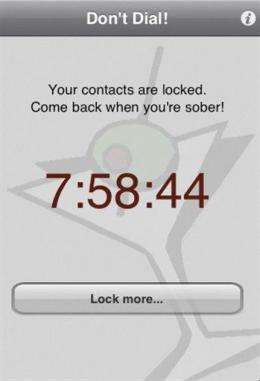Americans turn to technology to control impulses

(AP) -- Dan Nainan can't trust himself to work at his computer without clicking on distractions, so he uses an Internet-blocking program to shut down his Web access twice a day.
"I'm sorry, but try as I might, I could never, ever do this on my own," said the New York City comedian who's struggling to finish a book. "I wish I could, but I just don't have the discipline."
Nainan's system of two, two-hour blocks is one example of how Americans are trying to control their impulses using technology that steps in to enforce good behavior.
With the new year days away, many tools are now available to help people stay in line, including a GPS-enabled app that locks down texting once a car gets rolling and a program that cuts off credit-card spending. Another device monitors your workout and offers real-time voice feedback.
Have we entered an era in which electronics serve as mother, cop and coach because we can't manage our own desires?
Yep, said Ann Mack, a trend-watcher for JWT Intelligence, an arm of the marketing giant. She named "outsourcing self-control" and "de-teching" as two top trends for the new year.
"The thing is we're becoming more aware of these behaviors, and as a result, we're trying to seek help to circumvent some of our more base impulses," Mack said. "We're bombarded more and more with temptations on a regular basis, and it's getting increasingly difficult to deal with that."
Tools to cope with temptation are everywhere.
Some car owners are voluntarily using a technology developed for convicted drunk drivers - ignition locks attached to in-car breathalyzers.
Shelley Snyder, marketing coordinator for Intoxalock, said about 1.5 percent of the company's clients are voluntary, which includes parents imposing the setup on their young drivers.
"I know that isn't a lot, but it is growing at a slow, steady pace," she said.
One of Intoxalock's competitors, Guardian Interlock Systems, said its figures are slightly higher: 5 to 7 percent of clients are drivers voluntarily installing the equipment, with about 2 percent intended for use by teens.
Also gaining ground are clients using the system permanently after they've completed court-ordered monitoring - about 1 percent of Guardian's clients in 2010, compared with none the year before.
"We hope not to see these people again," said David Contreras, Guardian's vice president of operations. "It's the one product I've been associated with where I don't want to sell it to you twice."
If your drunken behavior tends to cause more remorse off the road than on, there's an app for that as well.
A handful - including "Don't Dial!" and "The Bad Decision Blocker" - will cut off your access to phone numbers for up to 24 hours, the former allowing you to name a friend as gatekeeper. Another app requires the answers to math questions before allowing you to send an e-mail, the presumption being it's really hard to do math while somehow impaired.
George Distler in Orlando, Fla., developed the BlackBerry app NOTXT n' Drive after a teacher at his daughter's high school was killed when a texting motorist - an older one - crossed a median and struck her car.
"I didn't even realize texting and driving was such a tremendous issue until I got into investigating it," he said. "I was challenged by my teenage daughters."
Distler, who had previously developed games for the iPhone, based the app on the notion that the safest way to deal with your phone while driving is to remove temptation altogether. His NOTXT runs in the background and, using GPS, automatically restricts texting via a phone's airplane mode when a car reaches 10 mph. It deactivates when it detects the car has stopped.
The app, sold in several other counties as well, hit the BlackBerry market Sept. 3 and has been downloaded about 2,000 times.
Among those downloading the app were three companies with a combined fleet of more than 1,200 trucks. Distler estimates about 48 percent of his sales are parents hoping to curtail the texting habits of young drivers.
"Nobody's really going to just put the phone down and not use it," he said. "The issue is we don't police ourselves."
Another app, Slow Down, alters the tempo of your music, depending on your driving speed, on an iPhone, iPad or iPod Touch. Using GPS, the music slows if a preset speed limit is exceeded and stops completely if you're over the limit by more than 10 mph. You can have your tunes back when you slow down.
What about other areas, like overspending?
Enter MasterCard's inControl program, which has one company partner in the United States, Citigroup. You can set a general cap and the bank cuts you off when you've reached your spending limit, or you can preset a monthly amount for specific purchases such as restaurant meals. Like other bank cards, you can also order up spending alerts.
Overthinking, overdrinking, overspending. What's left?
Are you lonely on your runs? Adidas has extended monitoring and data collection technology for its miCoach brand to include a "coaching mode." You can choose from a variety of voices to feed information about form and speed.
Mack thinks a greater awareness of how we consume has produced a growing awareness of the limits of self-control.
"The spotlight has definitely been put on that," she said. "We're increasingly living in this era of mindfulness. Expect more technology coming out that saves us from ourselves."
©2010 The Associated Press. All rights reserved. This material may not be published, broadcast, rewritten or redistributed.
















